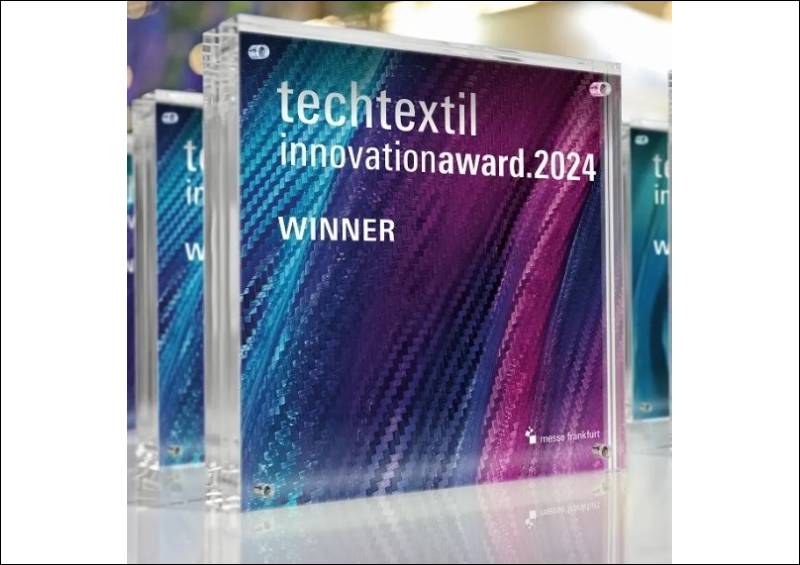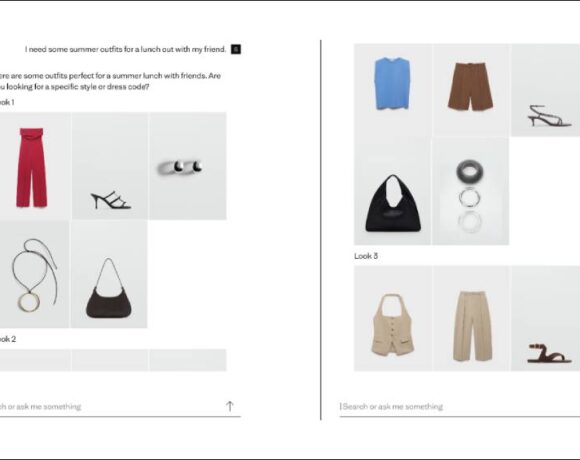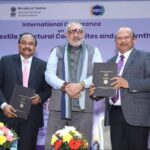Techtextil Innovation Award Picks Winners In Various Categories

The Techtextil Innovation Awards has picked winners across various categories, celebrating advances in textile industry, who have addressed key challenges in aviation, automotive, medicine, and construction.
Belgian textile research institute Centexbel bagged the award in the ‘New Approaches on Sustainability & Circular Economy’ category under the Techtextil Innovation Award.
The award is for a new process designed to improve the recycling of aircraft parts made from thermoplastic fibre composites in the future.
The Techtextil Innovation Award in the New Product category went to Portuguese Technological Center for the Textile and Clothing Sector (CITEVE) for an intelligent, textile-reinforced waterproofing system for flat roofs.
The Smart Roofs System (SRS) consists of a thermally reflective, water-based liquid sealing membrane and an intelligent textile reinforcement structure made from a jacquard fabric of recycled polyester.
There are three winners in the ‘New Technology’ category of Techtextil Innovation Awards.
A new type of coating for self-cooling textiles developed by the German Institutes of Textile and Fiber Research Denkendorf (DITF) has received a Techtextil Innovation Award in the ‘New Technology’ category.
Unlike sunshades or awnings, which only block the sun’s rays indirectly, the coating enables textiles to actively cool themselves.
German company Heraeus Precious Metals bagged an award in the ‘New Technology’ category for a new antimicrobial technology designed to better protect hospital patients from infections caused by septicaemia pathogens.
This involves using a precious metal-based additive called AGXX, due to which clothing and bed linen in hospitals and care facilities can be expected to have better antimicrobial properties than current solutions.
Swedish company LunaMicro too won an award in the ‘New Technology’ category for an intelligent moisture management technology.
The technology is a multi-layered, porous textile that is connected to a small battery. Integrated into a clothing, this smart textile pump actively transports liquids such as sweat from the inside of the garment to the outside, keeping the wearer dry.
Currently, the construction and building sector is responsible for around 40 percent of global CO2 emissions.
Huge amounts of CO2 are released, particularly during the production of concrete, one of the most important building materials.
The Institute of Textile Machinery and High Performance Material Technology (ITM) and the Institute of Concrete Structures (IMB) at the TUD Dresden University of Technology have received one of two Techtextil Innovation Awards in the ‘New Concept’ category.
It is for a new process that uses carbon to manufacture precast concrete elements and promises to save up to a third of concrete. With the new manufacturing process, precast hollow core slab elements have been produced with carbon fibre, which should save even more concrete and therefore CO2 emissions.
Biotech start-up Revoltech bagged the second award Techtextil Innovation Award under ‘New Concept’ category.
The German company received the award for its vegan, fully recyclable leather substitute made from hemp fibres called ‘LOVR’, which is an acronym for leather-like, plastic-free, vegan and residue-based.
LOVR is the world’s first truly circular leather substitute, according to Revoltech.
In the ‘New Technologies on Sustainability & Recycling’ category, the Techtextil Innovation Award went to Norafin Industries, which uses high-pressure water jets to bond fibres into a 3D shape.
Instead of just creating textile fabrics, the new process can be used to produce three-dimensional structures in a single stage, from the fibre to the end product.
The result is a 3D textile product that not only breaks new ground in terms of waste reduction but can also be made from biodegradable natural fibres.
SA-Dynamics has joined forces with industrial partners to develop recyclable insulating textiles made from bio-based Aerogel fibres for which the German company bagged the second Techtextil Innovation Award in the ‘New Technologies on Sustainability & Recycling’ category.
The new insulating textiles made from Aerogel fibres, which consists of over 90 percent air and can be processed on textile machines, will even outperform synthetic insulating materials in terms of their protective effect.
The awards ceremony will take place on April 23, 2024 at 12.30 pm in Hall 9.0 and the award-winning exhibits can be seen in Hall 9.1 up to and including April 26, 2024.















